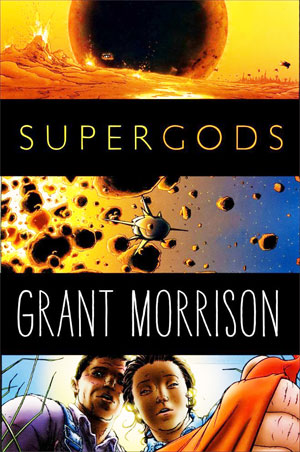Children of Supergods
Supergods by Grant Morrison
So we got Grant Morrison, who is pretty much the most important comic book writers working in the industry today. He’s written “The Invisibles,” “Animal Man,” “Arkham Asylum,” “Doom Patrol,” “Flex Mentallo,” “JLA,” “New X-Men,” “We3,” “Seven Soldiers,” “All-Star Superman,” and tons more. And he’s gone and written a book — a real book! With mostly words and not so many pictures! — about the history of superheroes. Not the history of comic books, but the history of superheroes. So what do we think of it?
This isn’t really a straight history. Sure, we start with Superman’s creation, move on to Batman, Captain Marvel, the Silver Age, Flash, Green Lantern, Spider-Man, the Fantastic Four, and on and on and on. But around the middle, the history starts mixing together with a Grant Morrison autobiography. Not a bad thing at all — like I said, he’s one of the most important guys working in comics right now — so it becomes a personal history of the superhero. From time to time, it becomes a full-on autobiography, as we follow Grant on trips around the world, doing drugs, experiencing ecstatic visions of the beings behind the universe, and working to create his best-known comics.
Where I think things really start kicking off strong is when Morrison starts talking his theories of superheroics — what makes superheroes work vs. what doesn’t make them work. He says — and I mostly agree — that the best superhero fiction is optimistic in tone and speaks to a desire of mankind to aspire to better things. While you can create great superhero comics founded on pessimism or realism — Alan Moore’s “Watchmen” and Frank Miller’s “The Dark Knight Returns” — if you use those to build an expanded comic universe on, you don’t get anything that’s a lot of fun to read. You get the grim-and-gritty ’90s.
Now I’m not the most optimistic guy in the world. I’ve never seen a speck of evidence that wishing for good things to happen is any way to drive off the inevitable disasters that plague us. For every football player who credits God for his latest touchdown, there are dozens of kids dying of cancer, scores of dirty cops looking for a way to cheat citizens of their rights, hundreds of homeless people trying to sleep on park benches, and thousands of newspaper commenters waving their “I’m a PSYCHO” flags like it’s their ticket to heaven. It’s a horrible world we live in, a horrible life to suffer through, and the only escape is no real escape at all.
But having said that, you really gotta have optimism in your superhero stories. They’re just not any fun otherwise. They’re big, over-the-top, thrill-of-the-future science fiction melodramas, and the entire point of all the spandex and capes and spitcurls is, aside from the obvious power fantasies, the desire to live in and create a better world. Why does grim, unsmiling Batman fight crime? To make a better world for his city. Why do the X-Men fight for a world that hates and fears them? Because they want to make a world that doesn’t hate and fear them.
The articulation of the ultimate optimism and aspirations of the superhero genre is probably the best and most thrilling part of Morrison’s book.
It’s not a perfect work, by any stretch. Morrison’s recent interview with Rolling Stone suggests that he soft-pedaled a lot of his opinions to spare others’ feelings. He’s quite complimentary of Brad Metzler’s “Identity Crisis” in the book, but he savages it in his interview. He mentions his disagreements with Alan Moore and Mark Millar in the book, but really uncorks on them in the interview. I think the book would be a great deal stronger if he’d been more honest with readers. (And his Rolling Stone interview would’ve been better if had acknowledged that, yes, he has also written comics that featured rapes.)
Verdict: Thumbs up. It’s a fun read. It’s a pretty insightful read. Its flaws don’t detract from its strengths. If you like superheroes, you should give it a read.

